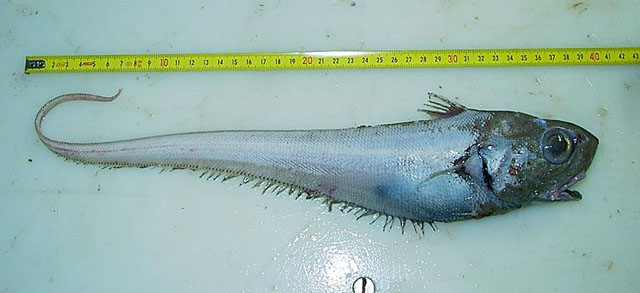| Macrouridae (Grenadiers or rattails) |
| 110 cm TL (male/unsexed); max.weight: 1,690.0 g; max. reported age: 54 years |
|
bathypelagic; marine; depth range 180 - 2600 m |
| North Atlantic: from about 37°N to Baffin Island and Greenland in the western Atlantic, and off Iceland and Norway to 73°N to Barents Sea, south to North Africa in the eastern Atlantic. Reported to occur from the tongue of the Ocean east of Andros Islands (about 24°N, 77°W) in the Bahamas. |
|
Dorsal spines (total): 2-2; Anal spines: 0-0. Head broad, rather soft; snout broad, rounded, with a large blunt tubercular scute at its tip; chin with small barbel. Scales relatively adherent; spinules dense on body scales, long, thin and recurved, narrowly lanceolate, with longitudinal anterior concavity. Pyloric caeca 29 to 31, long and slender. Color medium brown to grayish; orbits, oral and branchial cavities, and fins blackish to brownish gray. |
| Benthopelagic to bathypelagic in about 400 and 1200 m depth. Minimum depth from Ref. 1371. Form large schools at 600 to 900 m depth (Ref. 9988). Feed on a variety of fish and invertebrates, but primarily on pelagic crustaceans such as shrimps, amphipods and cumaceans; cephalopods and lantern fishes constitute a lesser portion of the diet. Batch spawner (Ref. 51846). This species is currently facing overexploitation in the North Atlantic. Utilized frozen and for fishmeal; can be fried and baked (Ref. 9988). |
|
Critically Endangered (CR); Date assessed: 11 July 2012 (A4bd) Ref. (130435)
|
| harmless |
Source and more info: www.fishbase.org. For personal, classroom, and other internal use only. Not for publication.

